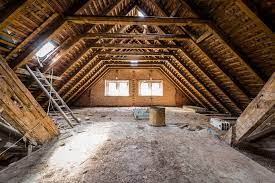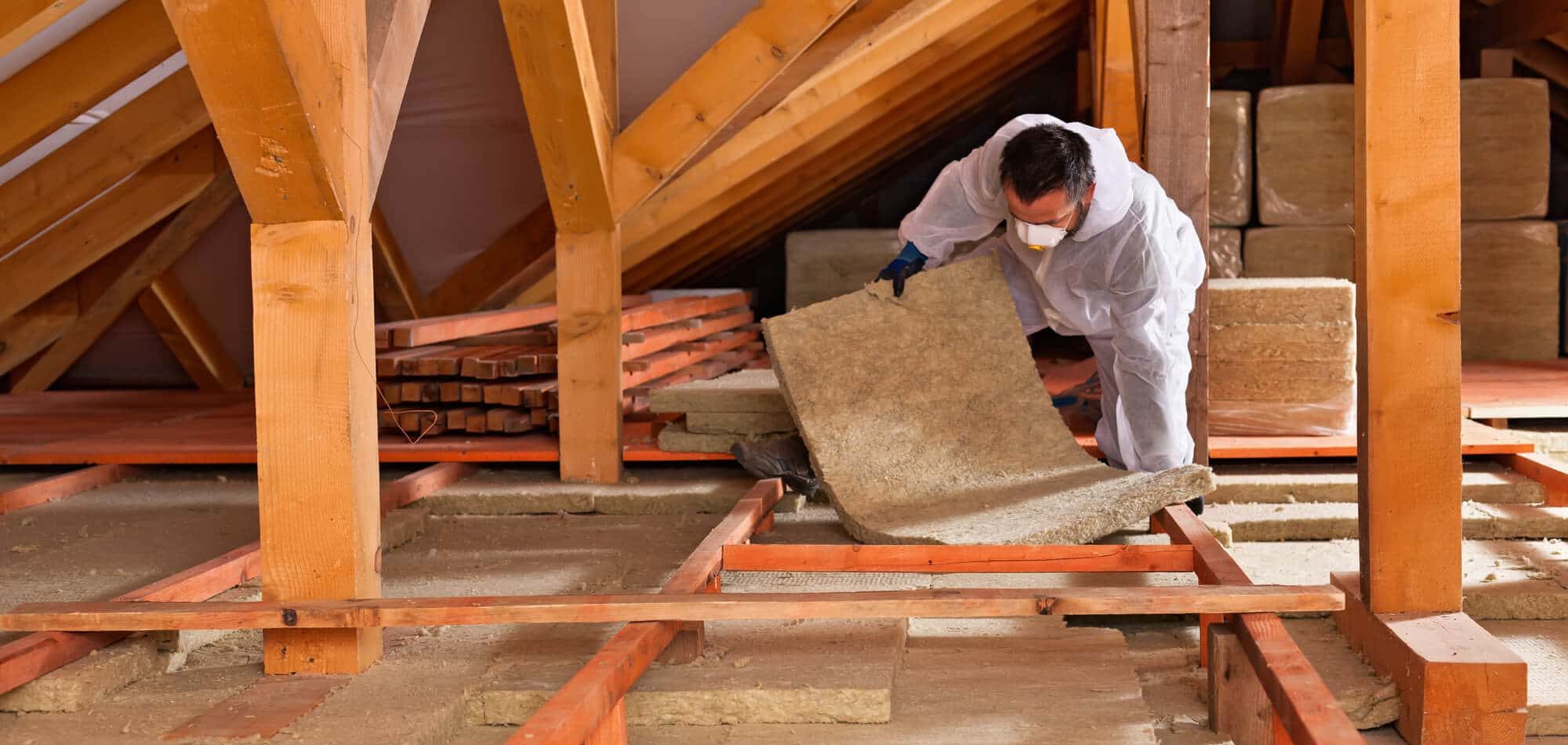
Do you want to protect your home from harsh weather and reduce utility bills? Well, attic insulation is one of the most efficient ways to achieve both. Proper (and adequate) attic insulation can substantially benefit energy efficiency, overall comfortability, and even soundproofing abilities.
A well-insulated attic will help keep unwanted drafts out – it also helps ensure consistent temperatures inside your home, even during the hottest days or coldest nights! Keep reading to learn about the benefits of proper quality attic insulation for your roof and home.
Attic Insulation for Your Roof and Home

Attic insulation helps to create an effective thermal barrier that keeps hot air out in the summer and cold air out during winter. It also prevents outside noise from entering your home, providing a peaceful and comfortable environment. Insulating your attic will help with heating and cooling costs to keep your home more comfortable year-round. An insulated attic can also help reduce the risk of ice dams forming on your roof.
Types of Attic Insulation

Fiberglass
These are made from recycled glass heated to molten and spun into fibers. Fiberglass new insulation is often used in attic spaces because it’s lightweight and non-combustible. It also has good soundproofing characteristics.
Cellulose
Cellulose insulation is made from recycled paper products like newspapers, cardboard, or magazines. It has very high R-values (the measure of an insulating material’s effectiveness), so it can provide better heat retention than fiberglass insulation. However, cellulose requires extra protection against rodents and moisture damage.
Spray Foam
This type of insulation is sprayed directly onto the surface, where it expands and adheres tightly to the insulated area, providing a better seal against air infiltration. It also has very high R-values so it can provide even greater energy efficiency than other types of insulation. However, spray foam insulation is more expensive and requires professional installation.
Benefits of Attic Insulation
The benefits of attic insulation are numerous:
Reduced energy bills
Properly insulated attics help keep the heat in during winter, and cool air out during summer, reducing energy consumption and resulting utility bills.
Improved comfortability
Properly insulated attics can create consistent temperatures throughout your home.
Soundproofing ability
Insulating materials such as cellulose or spray foam can provide an effective sound barrier against external noises while also helping to reduce internal sounds from within your home.
Increased durability of roofing materials
Proper attic insulation makes the temperature inside your unfinished attic more stable, which can greatly improve the longevity of roofing materials like shingles or tiles by preventing them from warping due to extreme temperatures outside.
Moisture control
Insulation helps prevent condensation and the growth of mold or mildew, which can be hazardous to your health.
Improved indoor air quality
Insulated attics can reduce the number of air pollutants such as dust, pollen, and other allergens entering your home.
Insect prevention
Attic insulation helps keep insects and other pests out by forming a physical barrier they cannot penetrate.
Additional living space
Properly insulated attics can provide an additional layer of warmth in winter months, making it more comfortable for people to use as a living space, such as an office or guest bedroom.
Increased curb appeal
Insulating materials also help reflect solar energy, so they can help keep your roof cooler, thus improving its overall aesthetic appeal.
Improved wall performance
Attic insulation helps maintain consistent temperatures on both sides of external walls and windows by providing an effective thermal barrier, improving performance and energy efficiency.
Reduced condensation
Insulation can help reduce the condensation that forms on interior walls and ceilings due to changes in temperature inside and outside your home.
Long-term saving
Investing in attic insulation now will save you money in the long run by reducing your utility bills and increasing the durability of your roofing materials.
Adding attic insulation is one of the best investments to protect your home from the elements and improve living comfort.
Steps To Insulate an Attic for Your Roof
Measure the Attic Area
In this, you need to measure the attic area, including walls and ceiling, that needs to be insulated.
Choose the Insulation Material
Choose an insulation material based on your needs, budget, and space constraints.
Install a Vapor Barrier
This is an important step as it helps keep out moisture and humidity. Most materials, such as cellulose or fiberglass, have no vapor barrier, so you must install one separately.
Install Batt Insulation or Blanket Roll Insulation
Batt insulation is pre-cut insulation that can easily fit between joists. In contrast, blanket roll insulation comes in rolls and is great for larger areas such as sloped roofs or cathedral ceilings.
Install Rigid Insulation Board
A rigid insulation board can be used to insulate the walls of your attic, as well as any access points, such as hatches or pull-down stairs.
Spray Foam Insulation
Spray foam insulation is a great option for hard-to-reach areas around electrical wiring or plumbing pipes. It has excellent air sealing qualities, which help reduce drafts and improve energy efficiency in the home.
Ventilation Requirements
Ensuring that your attic has proper ventilation is important to allow airflow and prevent moisture from building up inside the space. If installing a vapor barrier, ensure it extends up the walls at least 6 inches and is separated from the insulation.
Seal Other Gaps or Air Leaks
Finally, once you have installed your insulation, ensure no other air leaks in your attic, such as around windows, vents, or pipes. Sealing these with caulk or expanding foam will help improve energy efficiency and comfort in your home.
By following these steps, you can effectively insulate your attic and reap all the benefits of proper insulation.
FAQs
How long does attic insulation last?
With proper maintenance and upkeep, attic insulation can last for many years. Depending on the type of material used, it may need to be replaced every 5-10 years. However, having a professional inspect your attic regularly is important, as they can identify areas of wear and tear that may need addressing sooner.
How effective is attic insulation?
Properly installed and maintained attic insulation can significantly reduce energy costs, improve indoor comfortability, and even provide soundproofing capabilities. Some studies have shown that properly insulated attics can reduce energy usage by up to 20%! Ultimately, this helps homeowners save money in the long run and enjoy a more comfortable living environment.
Does attic insulation help keep the house cool?
Yes! Attic insulation helps keep your home cool in the summer by trapping hot air and preventing it from entering. This is especially beneficial for homes in areas with a lot of direct sunlight or high temperatures. Additionally, attic insulation helps prevent cold air from escaping during the winter, thus maintaining a consistent indoor temperature all year round.
Is attic insulation more important than walls?
While attic and wall insulation is important for energy efficiency, attic insulation is generally considered more crucial. This is because most of the air in your home rises naturally, meaning that hot or cold air can escape through gaps in attics more easily than through walls.
What part of the attic needs insulation?
Insulating the entire attic, including walls and attic floors, ensures optimal energy efficiency and comfort. This will help trap warm and cold air within your home, thus minimizing heat loss or gain.
Do all roofs need insulation?
Generally, all roofs should be insulated to maximize energy efficiency and maintain comfortable indoor temperatures. However, this may not always be necessary – depending on the type of roof and other factors. It’s important to consult with a professional before making any decisions regarding insulation for your roof.
Conclusion
this article has provided valuable information and insight into the benefits of attic insulation for your home. Proper insulation ensures comfort and energy savings throughout the year and reduces sound interference from outside sources. Properly insulating the attic should be a top priority for upgrading your roof or home.